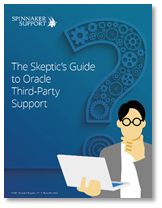Larry Goldman, Senior Director, Product Marketing
If you’re a champion of third-party support and know that it’s the right fit for your organization, then your next potential challenge may be how to sell this to the skeptics on your Oracle user and IT team. To help convert the skeptical, we produced “The Skeptics Guide to Oracle Third-Party Support,” a complimentary resource available for you to download.
Skeptics: A Love-Hate Relationship
Let’s be frank: skeptics are both a blessing and a curse. We love them because they demand facts, challenge assumptions, and often detect issues that might have otherwise gone undetected. On the other hand, if not properly handled, skeptics can complicate new initiatives, stubbornly dig into their position despite contrary evidence, and even slow or shut down your IT strategy.
There is never a single reason why people stake out a skeptical position. They could be genuine cynics, those Doubting Thomases or No-No Nellies who are immediately suspicious of everything (including you). They could be afraid of change or unfamiliar. They could fear the loss of their job or their organizational influence. Or perhaps they already feel powerless and see blunt skepticism as a tool to help regain even a small amount of control.
The Internet offers plenty of advice on how to handle nonbelievers, such as:
- Offer a direct 1:1 comparison between the current and future state
- Co-present your ideas with a trusted source
- Use evidence and data from verified third parties, like analyst firms
- Recruit endorsements from respected leaders
- Stroke their ego by acknowledging their strengths
These can work in a general sense, but when it comes to discussing third-party software support, you have plenty of other options as well.
Our Recommendations for How to Win Over Skeptics
If you have one or more active skeptics on your team, you may find that leaving Oracle for a third-party support vendor is not an easy transition for them. In our many conversations with doubters, we find that the best way to work with a skeptical individual or team is to take a straightforward, honest, and fact-based approach. Direct answers for direct people.
Here are some of the tactics that have worked for other organizations:
- Start early to identify the skeptics.
Each department or individual may have a separate set of concerns. The sooner you can identify these, the more time you’ll have to address them. Companies that do not convert skeptics soon enough may miss contract deadlines and even see their support initiative stumble or fail.
- Understand how much – or little – your team has been actually using Oracle support.
Gather a two- to three-year history of tickets issued to Oracle or SAP (types, priority level, etc.). This data can support your cost/benefit analysis, substantiate claims of poor support, and be ready for the third-party support discovery phase.
- Be familiar with your Oracle software licensing.
As your procurement or sourcing department will tell you, Oracle contracts are nothing if not complex. Gather specifics of your software application landscape: product lines that are in scope, language requirements, countries requiring tax and regulatory updates, used versus unused licenses, etc. Know your rights, end-of-maintenance dates, and how to cancel precisely as contractually required by Oracle. This information will help eliminate surprises and build your case for leaving Oracle.
- Build consensus on what is most important to your organization.
Organizations that choose to move to third-party support fall into one or more categories: 1) they want to sustain their existing products, 2) they eventually plan to migrate to a new system, or 3) they are in financial distress. Be clear on what the drivers are, and make sure that it’s first and foremost in your discussions. This focus can counter minor concerns that skeptics can use to try to derail your decision.
- Drop the rest and just lead with price.
If you’re struggling to win over skeptics, then focus on the hard cost savings and show them that it doesn’t pay to be a skeptic! In fact, the IT department and organization can use these savings for what they most want, whether that’s digital transformation, additional staffing, managed services, new IT initiatives, or simply applying the savings to improve the bottom line. Most employees are more excited about forwarding progress and new opportunities than they are unhappy with a transition to a new vendor.
Download the Complete Skeptics Guide
Finally, we recommend “The Skeptics Guide to Oracle Third-Party Support,” a resource that addresses 15 of the most frequently asked questions we hear from prospective customers and doubters.
Throughout the guide, we offer recommendations and links to other resources to help you determine if third-party Oracle support is a good fit for your organization. This guide can be a powerful tool to help you to win over the hearts and minds of your skeptical colleagues.



